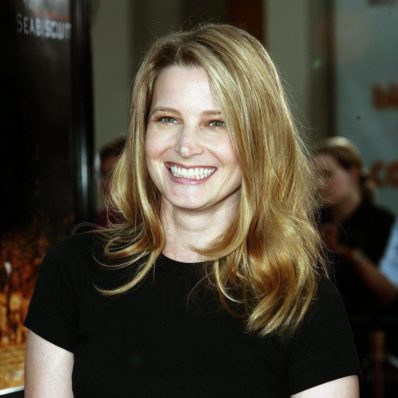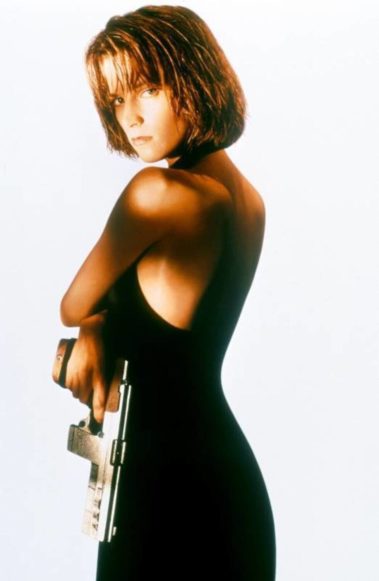 Who’s the smartest person in Hollywood? Many claim, probably correctly, that designation should go to the late agent and producer Ingo Preminger (1911-2006). He produced the enormously successful counterculture comedy MASH in 1971 and then (following less successful producing gigs on THE SALZBERG CONNECTION and THE GREAT SMOKEY ROADBLOCK) took his earnings and left Hollywood for good. A mighty smart move, you must admit.
Who’s the smartest person in Hollywood? Many claim, probably correctly, that designation should go to the late agent and producer Ingo Preminger (1911-2006). He produced the enormously successful counterculture comedy MASH in 1971 and then (following less successful producing gigs on THE SALZBERG CONNECTION and THE GREAT SMOKEY ROADBLOCK) took his earnings and left Hollywood for good. A mighty smart move, you must admit.
Who, then, is the second smartest person in Hollywood? My choice would be Bridget Fonda.
Who, then, is the second smartest person in Hollywood? My choice would be Bridget Fonda.
Ms. Fonda recently made the news, unfortunately enough, due to a sleazy tabloid intrusion in her life (for which I won’t provide a link). A highly reclusive figure credited by Wikipedia as “an American former actress,” back in the nineties she was one of the brightest stars on the scene, a radiant beauty and scion of one of Hollywood’s most prestigious dynasties. Hers was a striking (if short-lived) career, with many interesting film roles, a handful of prestigious award nominations, no trace of the substance abuse problems experienced by her father Peter or the political activism of her aunt Jane, and the ultimate in nineties cool: a part in a Quentin Tarantino movie.
Those are impressive accomplishments for an actress who commenced her career by appearing in various stages of undress. That was the case with ARIA (1987), an opera-themed anthology film whose best portion, involving a young couple having sex and committing suicide in a Las Vegas hotel room to the strains of Wagner’s “Liebestod,” starred Fonda, who spent much of the role au naturel. Her subsequent appearances in films like SCANDAL, SHAG and THE GODFATHER PART III likewise showed off her assets, with no trace of shame or embarrassment on her part. Fonda was, in short, a rarity in Hollywood: an actress fully comfortable with herself and her body.
Fonda was, in short, a rarity in Hollywood: an actress fully comfortable with herself and her body.
She also deserves credit for her eye for the offbeat, as evidenced by her participation in oddities like FRANKENSTEIN UNBOUND, IRON MAZE, LITTLE BUDDHA, THE ROAD TO WELLVILLE and TOUCH (she can’t be blamed for the fact that those films didn’t work out), and the fact that she reportedly turned down a lucrative film offer in favor of a tiny role in Sam Raimi’s ARMY OF DARKNESS. This put her ahead of the curve, as back then indie films were considered a risky career choice for actors (as opposed to now, when participating in such films is practically a requirement for any performer wanting to be taken seriously).
WELLVILLE and TOUCH (she can’t be blamed for the fact that those films didn’t work out), and the fact that she reportedly turned down a lucrative film offer in favor of a tiny role in Sam Raimi’s ARMY OF DARKNESS. This put her ahead of the curve, as back then indie films were considered a risky career choice for actors (as opposed to now, when participating in such films is practically a requirement for any performer wanting to be taken seriously).
Yet she also appeared in commercial fare like SINGLE WHITE FEMALE, Quentin Tarantino’s JACKIE BROWN and POINT OF NO RETURN—in which she was cast, somewhat incongruously, as a psycho junkie-turned-remorseless assassin. That’s not what I’d call an ideal fit, yet I’ve come to like the film, and actually prefer it to its French made antecedent LA FEMME NIKITA (1990), which now seems painfully obvious and single-minded. POINT OF NO RETURN, by contrast, is quirky and unconventional, not least because of its leading lady (and the Nina Simone tunes that pepper the soundtrack).
That film may have been a hit, as were SINGLE WHITE FEMALE and JACKIE BROWN, but Fonda’s appeal was somewhat limited in the grunge era. Nowadays she’d probably fit right in with the squeaky-clean public profiles demanded of modern-day media figures, but in Fonda’s heyday edginess was in, and the positive energy and unforced intelligence she exuded (in Hollywood it never pays to be too smart) were considered uncool.
Even her relationships, with partners that included Eric Stoltz and Dwight Yoakum, were handled in a discreet and mature manner (i.e. no sex tapes, cheating scandals or unseemly PDA). This had the effect of rendering her, in the words of one industry insider, “the most boring actress that ever walked the face of the Earth.” If you happened to be among those who saw SINGLE WHITE FEMALE during its initial August 1992 release, you may recall audiences enthusiastically cheering on Jennifer Jason Leigh’s character, a manipulative psychopath, and booing Fonda, whose role consisted largely of crying, screaming and getting chased around. Nor were audiences too enamored with her in SINGLES (1992), in which she was stuck in a role that might as well have been named “the Pretty Blonde One.”
In fairness, Fonda’s fellow nineties starlets Winona Ryder, Heather Graham and Linda Fiorentino didn’t fit the grunge mold any better than she. Generation X (a grouping that includes  yours-truly) were a notoriously picky bunch, rejecting would-be generational defining movies like the Ryder vehicle REALITY BITES (1994) and the Fonda headlined BODIES, REST & MOTION (1993) in favor of a most unexpected choice: Tarantino’s PULP FICTION, a violent comedy whose cast members were nearly all in their thirties and forties. It’s no wonder an exasperated media now dubs us “the forgotten generation,” and it seems Fonda, like most Gen-Xers, prefers it that way.
yours-truly) were a notoriously picky bunch, rejecting would-be generational defining movies like the Ryder vehicle REALITY BITES (1994) and the Fonda headlined BODIES, REST & MOTION (1993) in favor of a most unexpected choice: Tarantino’s PULP FICTION, a violent comedy whose cast members were nearly all in their thirties and forties. It’s no wonder an exasperated media now dubs us “the forgotten generation,” and it seems Fonda, like most Gen-Xers, prefers it that way.
In the 2000 tome JAMES ULMER’S HOLLYWOOD HOT LIST, which purports to rank Hollywood’s top 200 stars, Bridget clocked in at 183 (between Bill Pullman and Jeff Goldblum), with comments like “Her name makes no difference when we bring her up in negotiating sessions” and a “Career Trajectory” that was illustrated by a downward pointing arrow. Leaving Hollywood in 2002, with a reported $10 million net worth, was a wise decision, as she was able to bypass the straight-to-DVD quickies and Hallmark movies that would have assuredly been her future. Just look at the career arcs of the aforementioned nineties icons Ryder, Graham and Fiorentino, which haven’t been too inspiring.
Since her retirement, and 2003 marriage to Danny Elfman, Bridget Fonda kept an even lower profile than Ingo Preminger, who was known to make periodic appearances at MASH-related events throughout the 90s and 00s. Fonda’s last public appearance was in 2009, for the premiere of INGLOURIOUS BASTERDS. Since then she’s stayed out of sight, and based on recent events that’s probably a sound idea.
